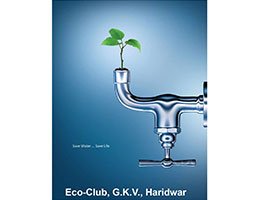DR. GAGAN MATTA
Co-ordinator, Eco – Club
Assistant Professor,
Department of Zoology and Environmental Science,
Gurukula Kangri (Deemed to be University), Haridwar, Uttarakhand
LIST OF FUTURE ACTIVITIES FOR ECO- CLUB –
(on environmental awareness and improvement of environment)
- Organise seminars, debates, lectures and popular talks on environmental issues in the University.
- Campaign against banned carry bags, use of loud speakers, banned fireworks, recycling of glass and metals, filling of water body in the adjacent area, use of unnecessary horns.
- Field visit to environmentally important sites including polluted and degraded sites, wildlife parks, etc.
- Organise rallies, marches, human chains and street theatre at public places with a view to spread environmental awareness
- Action based activities like tree plantation, cleanliness drives both within and outside the campus.
- Prepare inventories of polluting sources and forward it to enforcement agencies.
- Maintenance of public places like parks, gardens both within and outside the campus.
- Mobilise action against environmentally unsound practices like garbage disposal in unauthorised places, unsafe disposal of hospital wastes etc.
- Beautify selected road side area with plants and flowers and put campaign boards to generate awareness.
- Have a notice board specifically designated for the club. Split the board into 2 sections. One half giving information on local community, national and global environmental events, activities and news. The other half giving information on institute only activities and events.
- Start a institute wide clean up/reducing/recycling scheme. This should include promotion of the activities through assemblies and poster/leaflet campaigns.
- Arrange visits to the institute by outside organisations to give workshops, talks and other activities for the club and where necessary the whole institute. (Such as institute assemblies) Groups like RSPB, WWF (UK), Wildlife Trust and many other groups have local branches and educational officers who will visit your institute for free.
- Develop ways to raise funds for either the group (possibly to purchase any relevant materials that the club needs) or to be used to sponsor relevant activities such as sponsoring acres of rainforest.
- Implement animal, insect, flower and plant monitoring programmes for the institute grounds.
- Run a poster design competition with those taking part having their posters displayed at an exhibition at the institute to be attended by not only pupils and staff but also parents and invited guests. (This may be run through Art Department.)
- Design an energy cartoon type character that can be used for any reminder posters and stickers such as turning off lights and computers when not in use.
- Develop a programme to plant rare British flowers and plants at the institute. (There is an organisation called Landlife based in Liverpool who can provide these flowers and plants at cost.)
- Make crafts from recycled materials. These items could be used by the institute and/or sold to raise funds.
- Set up an energy patrol that will patrol the institute during beak, lunchtime and after institute making sure lights and appliances are off and to monitor wastage of heating.
- Write articles for the institute newspaper and possibly local papers and magazines.
- Develop a number of the reduce, reuse, recycling programmes that are mentioned in other areas of this report.

























